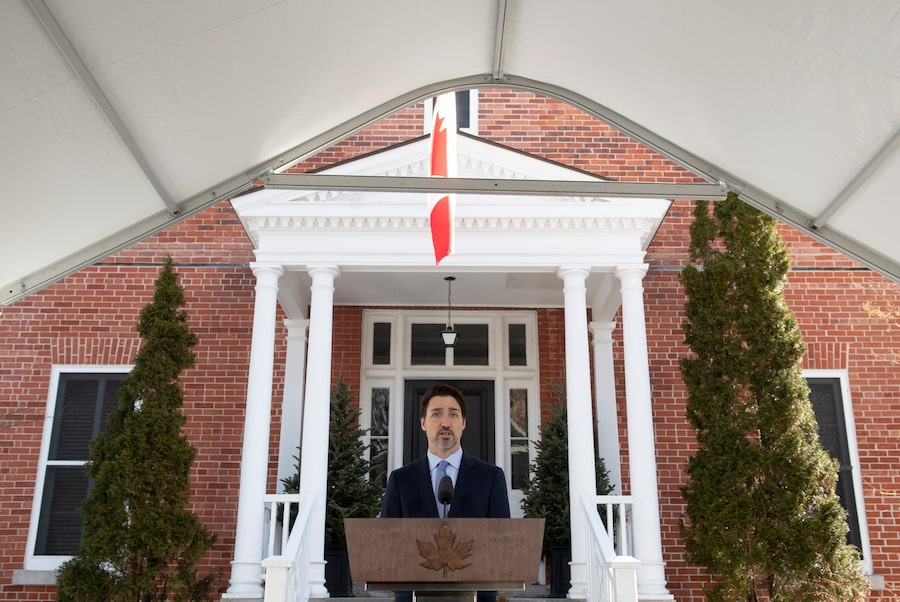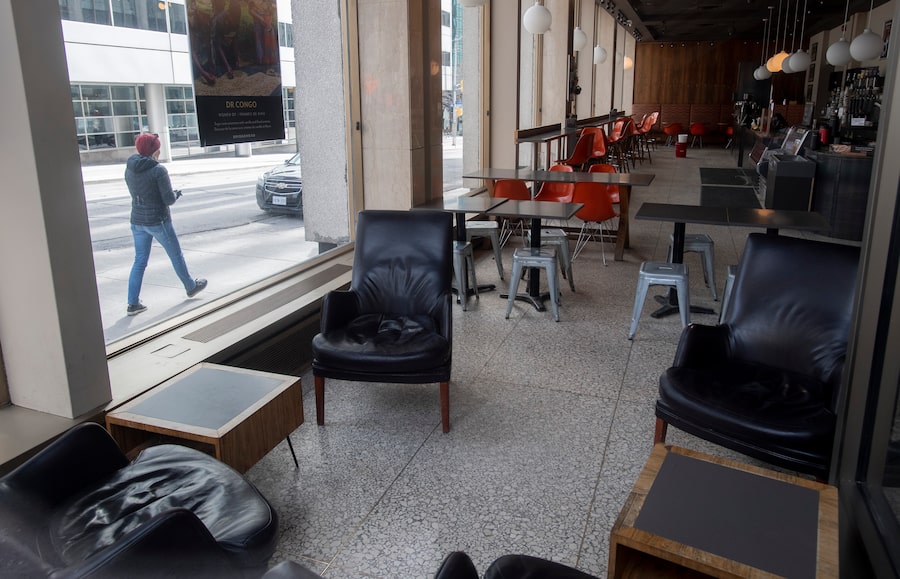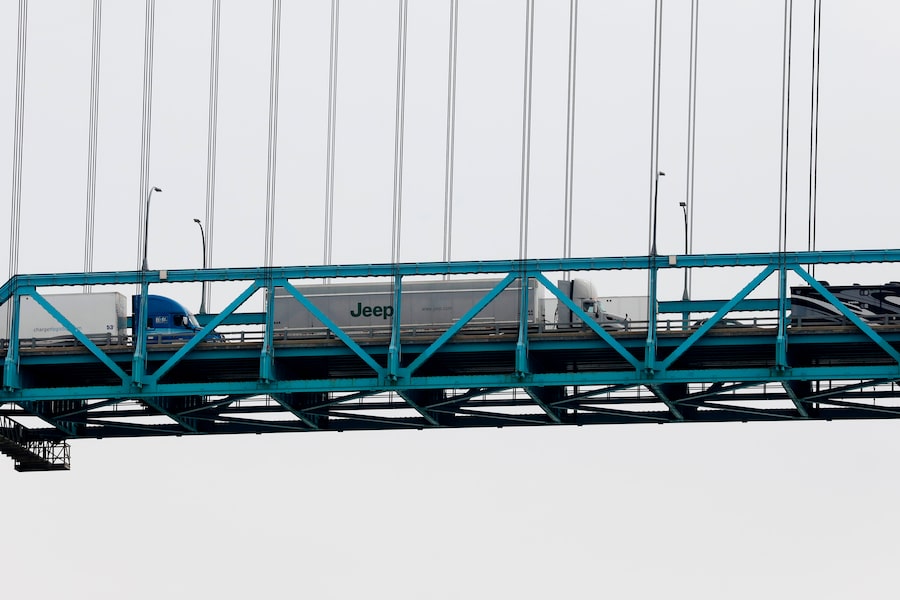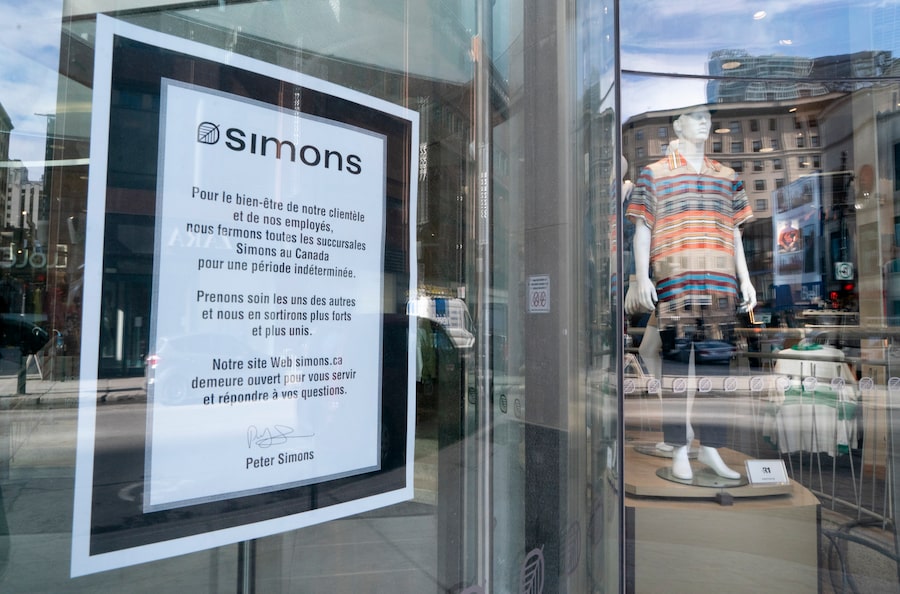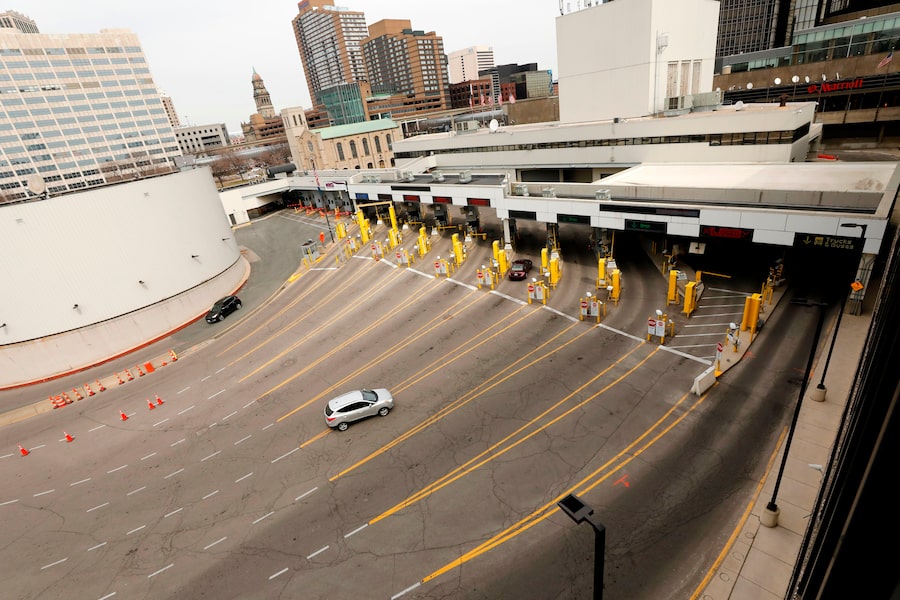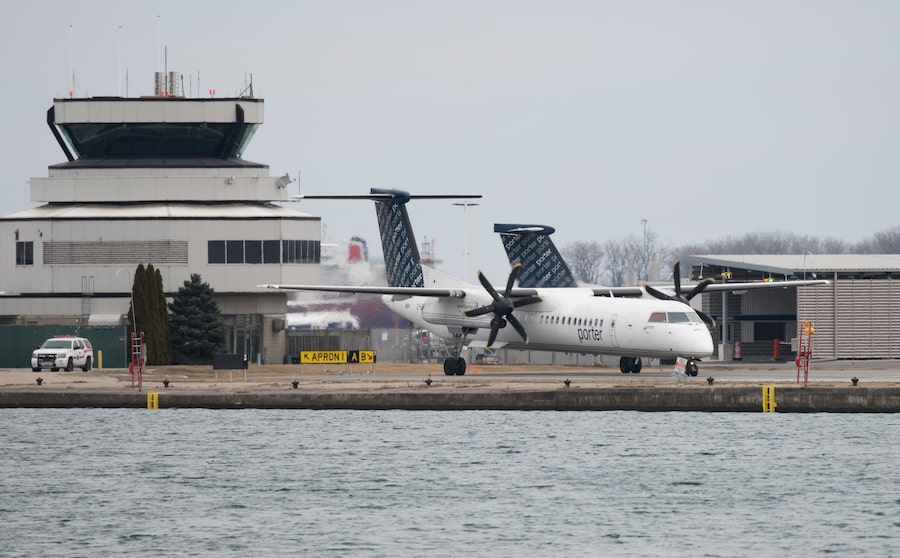(L to R) Canadians Diane Parsons, Jose Pereira, Maria Dalaguit and Eric Parsons head out from the border after crossing the Rainbow Bridge in Niagara Falls on March 18, 2020 by foot.Deborah Baic/The Globe and Mail
Latest headlines
- TSX drops over 7.5 per cent as scale of stimulus programs numbs global investors
- B.C., N.L. declare states of emergency
- Trudeau unveils $82-billion in aid, tax deferrals for coronavirus response
- Trump confirms Canada, U.S. to close border to non-essential travel
- Ford Motor Co said it would close its North American plants after Thursday evening’s shifts through March 30
- Quebec reports its first death from COVID-19
- Alberta announced measures designed to help people affected by the pandemic and low energy prices
The latest: How many coronavirus cases are there in Canada, by province, and worldwide?
If you are returning to Canada from anywhere, you need to self-isolate: Here’s how
I’m worried about seniors in this coronavirus outbreak. What’s the best way to keep them safe?
Explainer: What you need to know about COVID-19 and its toll around the world
11:35 p.m. ET
At least 77 Canadians on cruise with COVID-19 cases
Global Affairs Canada says at least 77 Canadians are on a trans-Atlantic cruise ship that has several COVID-19 cases among its passengers.
Costa Luminosa, which has more than 1,400 people on board, is heading for the French Mediterranean port of Marseille.
Spokesperson Angela Savard says Global Affairs is standing ready to provide consular assistance to the Canadians.
She says no further information can be disclosed due to provisions of the Privacy Act.
French authorities say the ship will arrive in Marseille port waters Thursday, but it’s not known if passengers will be allowed off, given the current stringent anti-virus movement rules imposed in France.
The ship was allowed to stop in Tenerife, Spain, on Sunday to offload three people who needed to be hospitalized, but the rest of the passengers were barred from disembarking in the Spanish Canary Islands.
–Canadian Press
11:15 p.m. ET
Ontario shutters provincial parks due to COVID-19
The Ministry of Environment, Conservation and Parks says it decided to shutter the parks until April 30 to protect the health of employees and visitors.
Andrew Buttigieg, a spokesman for the parks minister, says staff will post signs at park entrances to notify people about the closures.
He says where possible, park entrances will be gated and buildings locked.
Buttigieg says ministry staff will get in touch people who are in the backcountry or at campgrounds to tell them about the closure.
They’re being asked to leave by Thursday.
The closure includes all aspects of the parks, including day-use, car camping and backcountry camping.
–Canadian Press
9:00 p.m. ET
Ottawa announces new supports for workers that don’t qualify for EI benefits
Workers – including the self-employed – who don’t ordinarily qualify for employment insurance benefits would have access to income supports under sweeping new federal government measures announced on Wednesday.
The new measures would include an emergency care benefit for workers who must stay home because of the new coronavirus and don’t get paid sick leave. The new benefit would provide as much as $900 every two weeks for up to 15 weeks to those who don’t qualify for EI but are sick with COVID-19, quarantined or forced to stay at home to care for children or other family members who are sick. Applications for this benefit would start next month.
–Tavia Grant
8:00 p.m. ET
B.C. cases now at 231, including one at a residential care home
British Columbia announced 45 new cases of novel coronavirus Wednesday, bringing the total in the province to 231. The new cases included one at Haro Park Centre, a residential care home. No new deaths were reported Wednesday. To date, seven people in B.C. have died of the virus. The province declared a state of emergency Tuesday.
In a joint press conference Wednesday, health minister Adrian Dix and provincial health officer Bonnie Henry urged residents to follow provincial orders restricting travel and mass gatherings, calling the orders a last measure to slow the transmission of the virus.
–Wendy Stueck
6:30 p.m. ET
Kenney announces series of measures for those affected by pandemic, low oil prices
Alberta Premier Jason Kenney warned that his province is facing a level of adversity not seen since the Great Depression as he announced a series of measures designed to help people affected by the COVID-19 pandemic and historically low energy prices.
Mr. Kenny outlined what he described as the first wave of measures designed to help his province get through the pandemic, which has prompted governments around to world to shut down large sectors of their economies in a bid to slow the spread of the virus. They focused on income support and other measures to shield households and businesses from bills and tax payments that could be ruinous as people lose their jobs or go into self-isolation.
In Alberta, the province has ordered schools, daycares, bars, casinos and other businesses to close while banning large public events and placing restrictions on other sectors. At the same time, oil prices have fallen to crisis levels, with Western Canadian Select, the benchmark price for Alberta crude, briefly falling below US$8 per barrel on Wednesday, its lowest price ever. West Texas Intermediate hit about US$20, the lowest in more than two decades.
“We have never experienced anything like this in the history of our energy industry,layered on top of a massive global contraction of demand, and layered on top of five years of economic and social fragility," Mr. Kenney told the provincial legislature.
“We are facing a period of profound adversity.”
He said the government will make additional announcements, including significant economic stimulus measures, in the coming days.
–James Keller
5:15 p.m. ET
Newfoundland and Labrador declares public health emergency
Newfoundland and Labrador declared a public health emergency Wednesday while New Brunswick’s premier warned of harsh measures to come if people don’t follow instructions aimed at preventing the spread of COVID-19.
The move by Newfoundland and Labrador made previous recommendations from the province’s chief medical officer of health enforceable by law.
Under the order, businesses including bars, cinemas, theatres, gyms and arenas must close effective immediately and gatherings of more than 50 people are not permitted. Travellers returning from international travel are ordered to self-isolate for 14 days.
Health Minister John Haggie said individuals breaching the orders could be fined between $500 and $2,500 and could face jail sentences of up to six months. Possible fines for corporations range from $5,000 to $50,000.
“These are significant penalties,” Haggie said. “We hope we never have to use them, but they exist and if necessary, we will use them.”
Haggie said each day of non-compliance would be considered a new and separate offence. He said the order is for two weeks but he anticipates the order will be renewed “multiple times.”
The province is also limiting acute care facility visits to patients in obstetrics, end of life and children who are admitted.
There are three presumptive cases of COVID-19 in the province.
–Canadian Press
4:30 p.m. ET
B.C. declares state of emergency
Solicitor General Mike Farnworth is declaring a state of emergency in British Columbia to allow for the preservation of supply chains delivering groceries and other essential items.
Farnworth said it will also allow for the delivery of federal, provincial and local resources in a co-ordinated way.
“This is an all-hands on deck approach,” Farnworth told a news conference Wednesday.
The move follows Tuesday’s declaration of a public health emergency in B.C. over COVID-19.
Declaring a state of emergency gives the provincial government broad and sweeping powers that include controlling or prohibiting travel to and from the province. It also allows the province to procure, fix prices and ration food, medical supplies and other essential products.
It authorizes the province to compel any person to render assistance if they are qualified, however, Farnworth said he does not expect B.C. will have to require retired doctors, for example, to return to work.
“What we’re seeing is what we see every time we’ve had a disaster in this province — people stepping up and coming forward,” he said.
“I do not believe I’m going to have to use a power to force people to do what they instinctively know what they need to do.”
The state of emergency is initially in effect for 14 days and may be extended or rescinded as necessary.
–Canadian Press
4:15 p.m. ET
TSX sinks again
Canada’s main stock market fell over 7.5 per cent on Wednesday and losses for the loonie were the biggest in nearly 10 years as coronavirus-driven financial market stress, including plunging oil prices, had more impact than a fiscal stimulus package from Ottawa. (Read full story)
1:50 p.m. ET
Ridership on GO Transit falls 80 per cent
Ridership is down so much that Toronto’s most heavily used transit agencies say people can maintain safe “social distancing” while on board, though critics argue that some vehicles may still be too crowded.
Transit agencies have been exempted from Ontario’s guidelines restricting how many people can gather in one place – limits set at 250 people last week were lowered to 50 on Tuesday – raising questions about how their vehicles can be safe to use.
That was far from a problem Wednesday morning on GO Transit, which carries 300,000 people on the typical weekday. According to a spokeswoman, ridership was down 80 per cent from normal.
“We’ve never even seen it like this before,” Anne Marie Aikins, a spokeswoman for Metrolinx, which oversees GO Transit, said Wednesday. “Even with the reduced service [introduced Wednesday], we didn’t experience crowding.” (Read full story)
–Oliver Moore
1:27 p.m. ET
Quebec reports its first death from COVID-19
Quebec is reporting its first death from COVID-19. Premier Francois Legault says the death was an elderly person from the Lanaudiere region, northeast of Montreal. Dr. Horacio Arruda, Quebec’s director of public health, said the person had been in contact with people who had recently travelled. Legault says the province now has 94 confirmed cases, of which six are hospitalized and four are in intensive care.
-Canadian Press
1:02 p.m. ET
Transit agencies adjust services
Transit agencies across Canada are adjusting their operations as a result of the COVID-19 pandemic — in some cases by suspending fare collection altogether.
Transit commissions in Halifax, Saint John, N.B., and Hamilton say they will stop collecting fares, while Montreal transit is operating on something of an honour system.
The Societe de Transport de Montreal says fares aren’t being validated on buses and people who don’t use mobility aids should board at the back doors.
But the Toronto Transit Commission is taking a different approach, saying fare inspectors will be on board but will no longer issue fines to fare evaders, instead educating them on the rules.
The TTC says the inspectors will leave vehicles once there are 50 people on board in an effort to practice proper “social distancing.”
A spokeswoman for Saint John Transit says the agency has also blocked off the seat directly behind the driver for the sake of social distancing.
-Canadian Press
12:30 p.m. ET
CBC temporarily scraps local TV newscasts, except for the North
The CBC is temporarily scrapping most of its local TV newscasts and consolidating its resources to focus on coverage at CBC News Network amid the evolving COVID-19 crisis.
The public broadcaster says effective today, it won’t be airing local TV newscasts across the country except at CBC North, where TV news programming in Inuktitut will continue.
CBC North covers Yukon, Northwest Territories, Nunavut, and Northern Quebec.
A statement says CBC News Network will instead be the “core live breaking-news service” and replace all the other local supper-hour and late-night newscasts across the country on CBC and CBC Gem.
Local coverage will continue on radio, digital and social media.
The CBC says it’s also temporarily suspending its “Power & Politics” program so the Ottawa production team can be redeployed to CBC News Network.
-Canadian Press
12:09 p.m. ET
TSX, Dow drop over 5.5% as investors flee risk on coronavirus fears
Canada’s main stock index fell on Wednesday as concerns over the coronavirus pandemic continued to prompt selling in equities, while weakness in oil prices added to the pressure.
At 12 p.m. ET, the Toronto Stock Exchange’s S&P/TSX composite index was down 701.03 points, or 5.53%, at 11,984.18.
11 a.m. ET
Trudeau unveils $82-billion in aid, tax deferrals for coronavirus response
Prime Minister Justin Trudeau has unveiled a sweeping $27-billion emergency aid package that offers immediate and direct help to Canadians and businesses, plus $55-billion of tax deferrals, to help them survive the severe economic downturn caused by the coronavirus pandemic.
The massive stimulus package will inject cash into businesses to keep workers on the payroll even if they have been sent home and bolstering federal benefits and employment insurance programs. -Robert Fife, Bill Curry, Daniel Leblanc
11 a.m. ET
Quebec agriculture group warns of impact from border closing
Quebec’s biggest agricultural group warns it will not be able to plant and harvest local fruits and vegetables this summer if the country’s border is closed to foreign workers due to the novel coronavirus.
The Union des Producteurs Agricoles, which represents roughly 42,000 Quebec farmers and all forestry producers, urged the Canadian government to take steps to allow seasonal farm workers into the country. -Nicolas Van Praet
10:24 a.m. ET
Trump confirms Canada, U.S. to close border to non-essential travel
U.S. President Donald Trump announced Wednesday morning that Canada and the United States will be closing the border to non-essential traffic.
“We will be, by mutual consent, temporarily closing our Northern Border with Canada to non-essential traffic. Trade will not be affected. Details to follow!” Mr. Trump tweeted.
10 a.m. ET
No rate cut coming today, Bank of Canada says
Bank of Canada Governor Stephen Poloz will not announce any additional interest-rate cuts or other measures at his press conference scheduled for this morning with federal Finance Minister Bill Morneau, the central bank said Wednesday.
The bank issued an advisory to reporters stating: “In this morning’s press conference, the Governor intends to speak to the measures the Bank has taken to ensure the financial system has sufficient liquidity so that credit continues to be available to businesses and households. He will not be announcing any new measures or actions.” -David Parkinson
8:20 a.m.
Coronavirus-related cancellations sweep across cultural scene
Organizers of the iconic British music festival Glastonbury announced news of the “enforced fallow year" for the annual summer event held in the county of Somerset. Set for June 24-28, among the headliners were Taylor Swift, Paul McCartney, Kendrick Lamar, Diana Ross, Lana Del Rey and Pet Shop Boys. Canadian performers included Caribou and Rufus Wainwright. –Brad Wheeler
7:30 a.m.
Transat, Porter and Sunwing announce flight suspensions
Toronto-based Porter Airlines said it will stop flying flights on March 20 and leisure carrier Air Transat said it is gradually suspending flights until April 30, as countries close borders and travelers stay home amid the coronavirus epidemic.
Montreal-based Transat said it will operate repatriation flights to bring its customers back to Canada over the next two weeks.
The move mirrors that of another Canadian holiday airline, Sunwing Airlines, which on Tuesday said it is suspending outbound flights and issuing layoff notices as it flies customers back from resort destinations to the south. WestJet Airlines will halt international and U.S. flights as of March 23. -Eric Atkins
6:11 a.m.
Senators reveal first positive COVID-19 test in NHL
The Ottawa Senators announced on Tuesday that an unnamed player tested positive for COVID-19, becoming the first NHL player to be diagnosed with coronavirus.
The player is in isolation with “mild symptoms,” and the Senators asked the rest of the team to remain isolated while their medical staff monitors the health of the players.
–Reuters
5:40 a.m.
Global stocks tumbling despite government support packages
Global stocks stumbled back into the red on Wednesday with Wall Street futures pointing to more losses ahead as fears over the coronavirus fallout eclipsed large-scale support measures rolled out by policymakers around the globe.
Euro Stoxx 50 futures fell 4.5%, boding ill for European stock markets.
In Asia, MSCI’s broadest index of Asia-Pacific shares outside Japan dropped 1.4% to a low last seen in late 2016, led by a 6.4% fall in Australia. Japan’s Nikkei erased early gains to dip 0.2%.
U.S. stock futures fell 3.7% in Asia, falling to their daily limit outside U.S. trade, a day after the S&P 500 rose 6% and Dow Jones rose 5.2% or 1,049 points.
–Reuters
5 a.m. EDT
The latest numbers of COVID-19 cases in Canada as of 4 a.m.
— Ontario: 189 confirmed (including one death and 5 resolved)
— British Columbia: 186 confirmed (including 7 deaths, 5 resolved)
— Alberta: 97 confirmed
— Quebec: 74 confirmed
— Canadians quarantined at CFB Trenton: 8 confirmed
— Manitoba: 8 confirmed, 7 presumptive
— New Brunswick: 2 confirmed, 6 presumptive
— Saskatchewan: 8 presumptive
— Nova Scotia: 1 confirmed, 6 presumptive
— Newfoundland and Labrador: 3 presumptive
— Prince Edward Island: 1 confirmed
— Total: 566 confirmed (including 8 deaths, 10 resolved), 30 presumptive
The spread of the novel coronavirus that causes COVID-19 continues, with more cases diagnosed in Canada. The Globe offers the dos and don'ts to help slow or stop the spread of the virus in your community.
The Globe and Mail
Archives
March 17: Coronavirus latest news
March 16: Coronavirus latest news
March 15: Coronavirus latest news
Sign up for the Coronavirus Update newsletter to read the day’s essential coronavirus news, features and explainers written by Globe reporters.
